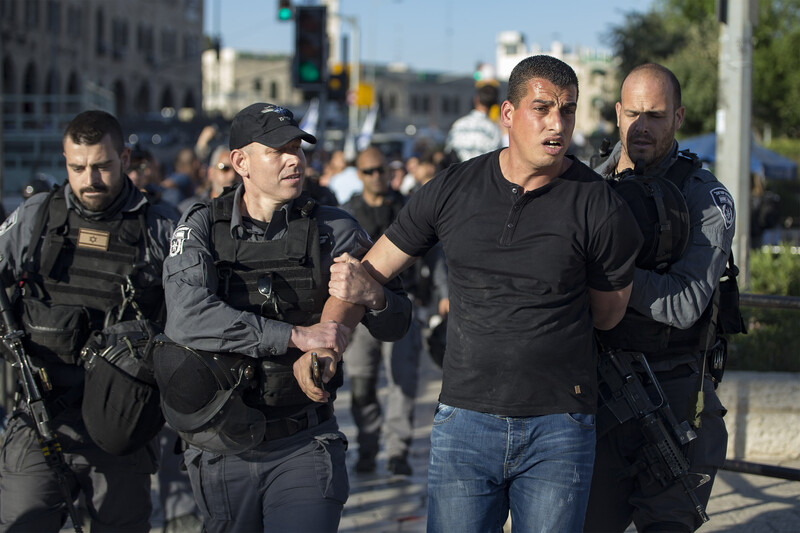Rights and Accountability 2 May 2017

Israeli Border Police arrest a Palestinian protester during a demonstration in support of hunger striking prisoners in Jerusalem on 29 April.
ActiveStillsAs Palestinian prisoners enter day 16 of their mass hunger strike, Israeli authorities are said to be obstructing negotiations and severely impeding communication from the strikers to the outside world.
As many as 1,600 Palestinians are refusing food in protest of ill treatment by Israeli prison authorities, including medical neglect and reduction of family visits.
Israel has attempted to prevent information on the striking prisoners from reaching the public by transferring protest leaders into solitary confinement and blocking visits by families and lawyers.
On Saturday, the Israel Prison Service reportedly ordered mobile phone companies to block reception in the western area of the Naqab desert in the south of the country to prevent Palestinians on strike in the Ketziot and Nafha prisons from communicating.
The blackout was partially lifted after Israeli residents in the area complained of service disruptions.
The cellular blackout was apparently coordinated by public security minister Gilad Erdan, who has taken a hard line against hunger strikes. Erdan pushed for the legalization of force-feeding in 2015 by calling hunger strikes a “new sort of suicide bombing to threaten the state of Israel.”
In an op-ed published by The New York Times on Monday, Erdan states that Israel will not “surrender to terrorism,” and the hunger strike has nothing to do with the mistreatment of Palestinian prisoners.
Attacks on solidarity protests
Throughout the occupied West Bank, including East Jerusalem, Israeli forces attacked gatherings and demonstrations in solidarity with hunger striking prisoners.
In the northern West Bank village Sebastia, soldiers fired tear gas at a sit-in on Monday, causing the protest tent to catch fire, two days after tear gas fired by Israeli forces caused a blaze in the village of Beita, south of Nablus.
The Israeli military used violent force against a coordinated “day of rage” throughout the West Bank on Friday.
Protesters were injured by tear gas, rubber-coated steel bullets and live ammunition.
While lawyers have been banned from hunger strikers at most detention centers, attorneys with the rights group Addameer have been able to visit with non-striking prisoners, who have given updates on the progress of the strike.
Addameer’s lawyers were told that Israel has continued to impose punitive measures on strikers, including transferring them to solitary confinement, prohibiting them from participating in group prayer on Fridays and banning them from washing their clothing.
Salt confiscated
A prisoner told Addameer that prison officials seized salt from hunger strikers, which they consume to stabilize and prevent long-term damage to their health.
A lawyer from the Palestinian Authority committee on prisoners’ affairs accused Israeli officials of “psychological torture” by putting food in front of the striking prisoners.
Last week, the Palestinian Authority body and the Palestinian human rights group Adalah filed a joint petition to Israel’s high court over the Israel Prison Service’s ban on meetings between hunger strikers and their lawyers.
The court is scheduled hear the petition on Wednesday.
The groups state that the Israeli prison authorities are violating a 2004 high court ruling which states that it is illegal to bar meetings between prisoners – including those on hunger strike – and their lawyers.
The health of several hunger strikers is said to have deteriorated, but information is difficult to confirm due to communication restrictions.
Israel is meanwhile reportedly impeding negotiations by conditioning them on the exclusion of Marwan Barghouti.
Barghouti, a leader of the Fatah party who is serving multiple life sentences since his arrest in 2002, launched the mass hunger strike on 17 April, which marks Palestinian Prisoners’ Day, though the campaign has generated widespread support among Palestinians from multiple political factions.






Comments
The suffering of prisoners
Permalink Growl replied on
Fyodor Dostoyevsky said: "The degree of civilization in a society is revealed by entering its prisons."
Israeli society has suffered greatly from its 50 year occupation and oppression of the Palestinians. A sick, racist, militant culture devoted to keeping the other down. Not surprising, the whole occupation (not to mention the siege of Gaza) is a grand Prisoner Experiment, causing a degradation of morals in the Israeli guards. And all of the Palestinians are effectively prisoners.
the hunger is for justice
Permalink tom hall replied on
A hunger strike is the single least violent option available to victims of injustice. Yet Israel proclaims the tactic to be a weapon in the arsenal of terrorism. Seriously, is there any act of protest that doesn't come under the heading of terrorism as defined by Israel? After reading accounts of the abuses inflicted on captives in the prison system there, beginning with their initial kidnapping, I have one question to the administrators of this regime: what do you want them to do? Do you even know any longer? Isn't the goal one of brutality and humiliation for its own sake?
How can anyone with a modicum of conscience go on supporting and sustaining such a regime?
Israel's Inhumanity & Insanity
Permalink Ray Doherty replied on
Israel, the self-proclaimed "only democracy (sic) in the Middle East" is fond of arresting and detaining Palestinian protestors and holding them with charge or trial. This is Israel's draconian policy of "administrative detention" where any Palestinian can be kidnapped, detained, tortured and held indefinitely by Israeli security services for any reason, or for no reason. Israel doesn't know how to respond to non-violent actions like hunger strikes, so they term it a form of "terrorism." Israel's logic is ludicrous and boggles the mind and conscience. The Israeli government has been using violence against Palestinians since 1948 and it hasn't brought them peace nor security. One of the definitions of insanity is doing the same thing over and over, but expecting different results. This is the sheer insanity of Israel's brutal occupation and "security" policies by which any action they undertake is justified.